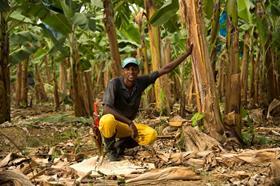
Fyffes has been recognised by the Latin American and Caribbean Network of Fairtrade Small Producers and Workers (CLAC) for its commitment to buying bananas from many of the region’s small producers and its role as the largest Fairtrade banana buyer.
The award was presented at the Fairtrade International General Assembly in San Jose, Costa Rica, whose theme this year was 'Fairtrade: Thirty Years Creating Value with Producers Worldwide'.
The event brought together participants from around the world, representing organisations within the global Fairtrade System, while the agenda included a 'Night of Tribute', during which CLAC recognised organisations and people who have played a fundamental role in the development and strengthening of fairtrade practices.
Fyffes was recognised in the 'Trader' category, for its valuable trajectory as the largest Fairtrade banana buyer and its commitment to balanced purchases from small producer organisations and plantations.
“This year we are celebrating the 30 years since Mexican coffee producers decided to advocate for better trade conditions to reduce their dependencies on charity and off-farm activities, creating the basis for what is today the Fairtrade Movement,” said CLAC chair Marike Runneboom de Peña in a letter advising Fyffes of its award.
Fyffes has received numerous Fairtrade and international certifications. In April, its Sur Agrícola de Honduras (Suragroh) melon operation in Honduras received Fair Trade certification from Fair Trade USA, a non-profit organisation that sets standards, certifies and labels products that promote sustainable livelihoods for farmers and workers, and protect the environment. Fyffes is also the importer with the world’s highest number of GlobalGAP certified production partners.
“Fyffes is honoured to have received this important award from CLAC during the Fairtrade International General Assembly,” said David McCann, chairman Fyffes. “This is another recognition of Fyffes commitment to maintaining fairtrade and sustainable business practices, including supporting small producers who are important contributors to economic development in their communities.”



